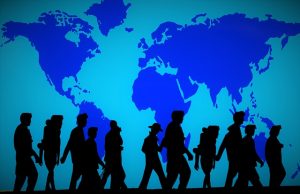 Over the last few decades, our society has absorbed a huge number of immigrant newcomers with remarkable ease, but things are changing … people can feel trouble and strife building, particularly in the education sector.
Over the last few decades, our society has absorbed a huge number of immigrant newcomers with remarkable ease, but things are changing … people can feel trouble and strife building, particularly in the education sector.
It’s not regarding any particular nationality. London has proved that by its willingness to accept non-Englishness in its highest office of Mayor. Sadiq Khan is the first Muslim to lead the capital.
But unprecedented levels of immigration are transforming our society and particularly our schools …is the problem of discord and division, which is already apparent in society, going to spread into our educational system and schools?
At present, people all over the country are fed up of not being able to get their child into their local school or of having their child surrounded by other children not able to speak English. Teachers are no longer able to read stories aloud to the class as half the children, if not more, do not know what they are being read. However, this scenario changes as the immigrant children begin to do well at school.
The result of this is that white British people are in a minority in several places, including London, Luton, Slough and Leicester. It has been said that half of non-white ethnic pupils go to schools where white Britons are in a minority. British boys are becoming one of the worst performing groups in the UK, recently dubbed an “educational underclass”.
This indicates a society that is not integrated but polarized – and one struggling to cope in education and also in health. Some immigrants don’t learn the English language themselves, and so are unable to help their children get more out of school, often speaking their own language at home, so the child will never develop that all-important vocabulary.
I am a firm supporter of immigration, but it can become a very challenging issue when we are unable to manage the enormous magnitude we are experiencing now. As the child of immigrants myself, I have spent much of my life voicing against discrimination, both racial and social, as well as the injustice that goes with it. I know it was hard for my parents to find their feet in a 1950s England, but they wanted to settle here, to have children here, and to integrate. They learnt English quickly and got jobs, developing friendships with their fellow workers and neighbours…I heard them sharing their jokes and their British ways.
Now it seems whole communities are building up their own mini-town in a particular part of town, with their own shops and groups. This is leading to an insular society, though it can add to the cultural richness of a place. However, with the integration of the past gone now, we can clearly see polarization. Immigration is very good for both the culture and economy of a country. However, it is important that the immigration goes hand-in-hand with cooperation, fusing and blending cultures rather than isolating them.
HOW we educate our children, all children, is extremely important if we are to avoid violence and hostility in a fragmented society, even at school level. Over the last few decades, our society has absorbed a huge number of immigrant newcomers with remarkable ease. But things are changing…people can feel the change in the fabric of society, starting with our children at school. The warp and weft of the complex pattern of many cultures harmonising with each other is unravelling. For the sake of our children, we need to solve these issues before they become serious problems.